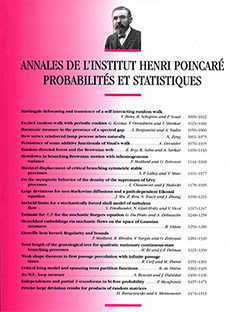Abstract
Let $(X,{\mathfrak{X}},\mu)$ be a standard probability space. We say that a sub-σ-algebra ${\mathfrak{B}}$ of ${\mathfrak{X}}$ decomposes μ in an ergodic way if any regular conditional probability ${}^{\mathfrak{B}}\!\!P$ with respect to ${\mathfrak{B}}$ and μ satisfies, for μ-almost every x∈X, $\forall B\in{\mathfrak{B}},{}^{\mathfrak{B}}\!\!P(x,B)\in\{0,1\}$. In this case the equality $\mu(\cdot)=\int_{X}{}^{\mathfrak{B}}\!\!P(x,\cdot)\mu(\mathrm{d}x)$, gives us an integral decomposition in “${\mathfrak{B}}$-ergodic” components.
For any sub-σ-algebra ${\mathfrak{B}}$ of ${\mathfrak{X}}$, we denote by $\overline{\mathfrak{B}}$ the smallest sub-σ-algebra of ${\mathfrak{X}}$ containing ${\mathfrak{B}}$ and the collection of all sets A in ${\mathfrak{X}}$ satisfying μ(A)=0. We say that ${\mathfrak{B}}$ is μ-complete if ${\mathfrak{B}}=\overline{\mathfrak{B}}$.
Let $\{{\mathfrak{B}}_{i}\dvt i\in I\}$ be a non-empty family of sub-σ-algebras which decompose μ in an ergodic way. Suppose that, for any finite subset J of I, $\bigcap_{i\in J}\overline{{\mathfrak{B}}_{i}}=\overline{\bigcap_{i\in J}{\mathfrak{B}}_{i}}$; this assumption is satisfied in particular when the σ-algebras ${\mathfrak{B}}_{i}, i∈I, are μ-complete. Then we prove that the sub-σ-algebra $\bigcap_{i\in I}{\mathfrak{B}}_{i}$ decomposes μ in an ergodic way.
Soit $(X,{\mathfrak{X}},\mu)$ un espace probabilisé standard. Nous disons qu’une sous-tribu ${\mathfrak{B}}$ de ${\mathfrak{X}}$ décompose ergodiquement μ si toute probabilité conditionnelle régulière ${}^{\mathfrak{B}}\!\!P$ relativement à ${\mathfrak{B}}$ et μ, vérifie, pour μ-presque tout x∈X, $\forall B\in {\mathfrak{B}},{}^{\mathfrak{B}}\!\!P(x,B)\in\{0,1\}$. Dans ce cas l’égalité $\mu(\cdot)=\int_{X}{}^{\mathfrak{B}}\!\!P(x,\cdot)\mu(\mathrm{d}x)$, nous donne une décomposition intégrale en composantes “${\mathfrak{B}}$-ergodiques.”
Pour toute sous-tribu "${\mathfrak{B}}$ de ${\mathfrak{X}}$, nous notons $\overline{\mathfrak{B}}$ la plus petite sous-tribu de ${\mathfrak{X}}$ contenant ${\mathfrak{B}}$ et tous les sous-ensembles mesurables de X de μ-mesure nulle. Nous disons que la tribu ${\mathfrak{B}}$ est μ-complète si ${\mathfrak{B}}=\overline{\mathfrak{B}}$.
Soit $\{{\mathfrak{B}}_{i}\dvt i\in I\}$ une famille non vide de sous-tribus de ${\mathfrak{X}}$ décomposant ergodiquement μ. Supposons que, pour toute partie finie J de I, $\bigcap_{i\in J}\overline{{\mathfrak{B}}_{i}}=\overline{\bigcap_{i\in J}{\mathfrak{B}}_{i}}$; cette hypothèse est satisfaite si les tribus ${\mathfrak{B}}_{i}$, i∈I, sont μ-complètes. Alors la sous-tribu $\bigcap_{i\in I}{\mathfrak{B}}_{i}$ décompose ergodiquement μ.
Citation
Albert Raugi. "A probabilistic ergodic decomposition result." Ann. Inst. H. Poincaré Probab. Statist. 45 (4) 932 - 942, November 2009. https://doi.org/10.1214/08-AIHP302
Information





